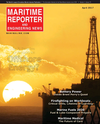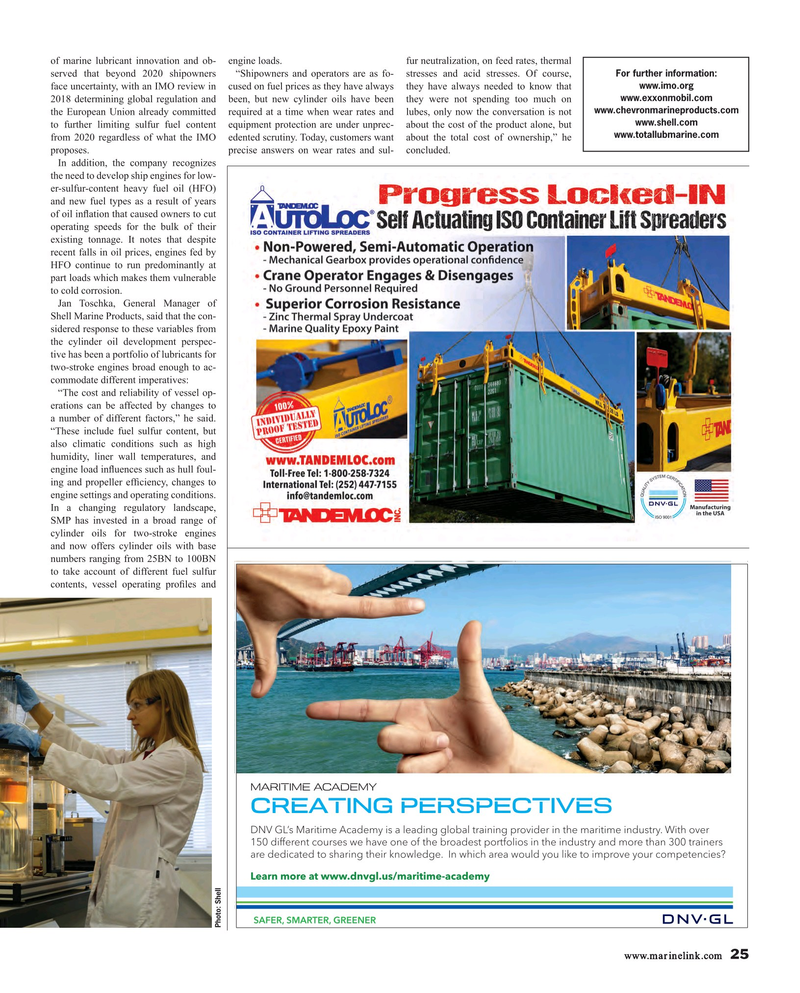
Page 25: of Maritime Reporter Magazine (April 2017)
The Offshore Annual
Read this page in Pdf, Flash or Html5 edition of April 2017 Maritime Reporter Magazine
of marine lubricant innovation and ob- engine loads. fur neutralization, on feed rates, thermal
For further information: served that beyond 2020 shipowners “Shipowners and operators are as fo- stresses and acid stresses. Of course, www.imo.org face uncertainty, with an IMO review in cused on fuel prices as they have always they have always needed to know that www.exxonmobil.com 2018 determining global regulation and been, but new cylinder oils have been they were not spending too much on www.chevronmarineproducts.com the European Union already committed required at a time when wear rates and lubes, only now the conversation is not www.shell.com to further limiting sulfur fuel content equipment protection are under unprec- about the cost of the product alone, but www.totallubmarine.com from 2020 regardless of what the IMO edented scrutiny. Today, customers want about the total cost of ownership,” he proposes. precise answers on wear rates and sul- concluded.
In addition, the company recognizes the need to develop ship engines for low- er-sulfur-content heavy fuel oil (HFO) and new fuel types as a result of years of oil in? ation that caused owners to cut operating speeds for the bulk of their existing tonnage. It notes that despite recent falls in oil prices, engines fed by
HFO continue to run predominantly at part loads which makes them vulnerable to cold corrosion.
Jan Toschka, General Manager of
Shell Marine Products, said that the con- sidered response to these variables from the cylinder oil development perspec- tive has been a portfolio of lubricants for two-stroke engines broad enough to ac- commodate different imperatives: “The cost and reliability of vessel op- erations can be affected by changes to a number of different factors,” he said. “These include fuel sulfur content, but also climatic conditions such as high humidity, liner wall temperatures, and engine load in? uences such as hull foul- ing and propeller ef? ciency, changes to engine settings and operating conditions.
In a changing regulatory landscape,
SMP has invested in a broad range of cylinder oils for two-stroke engines and now offers cylinder oils with base numbers ranging from 25BN to 100BN to take account of different fuel sulfur contents, vessel operating pro? les and
ECAP propeller by MMG
MARITIME ACADEMY
CREATING PERSPECTIVES
DNV GL’s Maritime Academy is a leading global training provider in the maritime industry. With over
GLiHUHQWFRXUVHVZHKDYHRQHRIWKHEURDGHVWSRUWIROLRVLQWKHLQGXVWU\DQGPRUHWKDQWUDLQHUV
DUHGHGLFDWHGWRVKDULQJWKHLUNQRZOHGJH,QZKLFKDUHDZRXOG\RXOLNHWRLPSURYH\RXUFRPSHWHQFLHV"
Learn more at www.dnvgl.us/maritime-academy
Learn more at
SAFER, SMARTER, GREENER
Photo: Shell www.marinelink.com 25
MR #4 (18-25).indd 25 MR #4 (18-25).indd 25 4/4/2017 2:02:47 PM4/4/2017 2:02:47 PM

 24
24

 26
26
